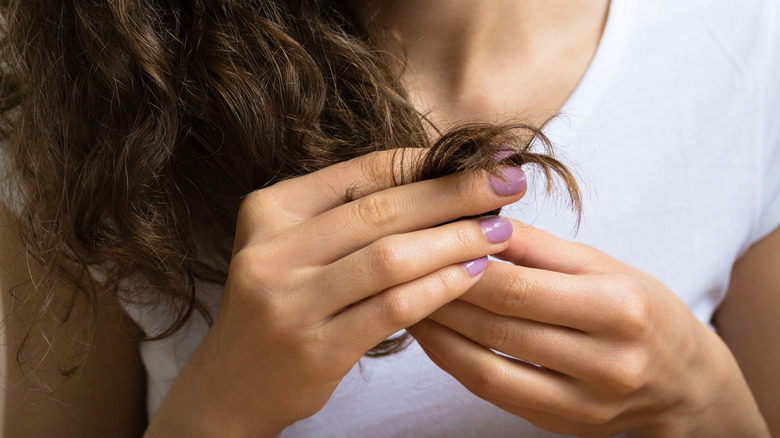What Is Moisture Overload And What Can It Do To Your Hair?
Ensuring that you have a good hair day every single day can be pretty laborious, but it's especially difficult if you have curly locks. Curly strands are apparently predisposed to dryness by design, since the oil and moisture your scalp produces take longer to reach each one. "Curly hair has an uneven shape with dips and lifts," Norris Ogario, founder of hair care brand Ogario London, told Healthline. "At its highest points, it can be prone to breakage and moisture loss."
If you have curly hair or have strands that often feel like straws, you may be inclined to overcompensate by dousing your head in moisturizing products like conditioners, masks, and creams. And while your hair does indeed need moisture to be strong and healthy, you may not be aware that over-moisturizing is a thing, which leads to an imbalance and results in moisture overload. As it turns out, subjecting your locks to too much moisture can be harmful and may even lead to damage if not reversed.
Yes, you can really over-moisturize your hair
Just like how it's possible to over-moisturize your skin, it's also possible to over-moisturize your precious locks. Wonder Curl notes that over-moisturizing is common with curly-haired folks to hydrate their dry strands. But unfortunately, using too much conditioner and moisturizing products results in moisture overload, a condition manifested by limp strands, lack of volume, greasiness, and breakage. It happens when there's more moisture in your hair than there is protein.
Aside from using too many moisturizing products, Loved By Curls pointed out that moisture overload is also caused by far too frequent hair washing, leaving your hair wet or damp for hours on end, and failure to use protein treatments. Even though your hair is technically almost entirely made of protein, complementary protein treatments are still essential to further strengthen your hair. "As we lose moisture and nourishment, the keratinized protein begins to unravel and break down," board-certified dermatologist Dr. Ava Shamban shared with Byrdie. "It loses strength, elasticity, and the bonds weaken. Rebuilding, supporting, and boosting this protein matrix is key to healthy hair and scalp."
If you suspect that your hair has reached the point of moisture overload, the good news is you can reverse it by cleansing your hair with a clarifying shampoo, reducing the frequency of your deep conditioning, and using protein treatments. Drying your locks using a diffuser is also said to help restore your hair's balance.
Is moisture overload the same as hygral fatigue?
People tend to conflate moisture overload and hygral fatigue because they have similar symptoms, but they're not the same. Hygral fatigue is the more intense version of moisture overload, and it happens when you've been over-moisturizing for far too long. "Hygral fatigue is essentially a type of hair damage that is brought on by excessive expanding and contracting of the hair follicle," stylist and salon owner Jessica Shultz explained to First for Women. "It's caused by over-moisturizing. The moisture is what causes the follicle to expand and contract more often than [it's] meant to."
When you have hygral fatigue, it means that your hair cuticles are already damaged and have increased porosity. You'd know you have it if your locks have become more prone to tangle and frizz, or if they keep breaking and have a gummy consistency. According to Healthline, hygral fatigue isn't something you can't reverse, so what you can do moving forward is to prevent it from happening again. You can start by washing your hair with a low-pH shampoo, applying coconut oil, and brushing your locks properly.


